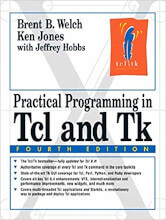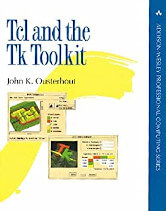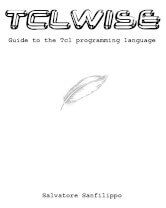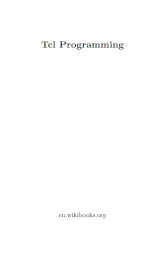Last Updated on November 13, 2022
Tcl (Tool Command Language) is a dynamic programming/scripting language based on concepts of Lisp, C, and Unix shells. It can be used interactively, or by running scripts (programs) which can use a package system for structuring, hence allowing to do much with little code.
The name Tcl is derived from “Tool Command Language” and is pronounced “tickle”. Tcl is a radically simple open-source interpreted programming language that provides common facilities such as variables, procedures, and control structures as well as many useful features that are not found in any other major language.
Tcl was created in 1988 by John Ousterhout and is distributed under a BSD style license. The first major GUI extension that works with Tcl is Tk, a toolkit that aims to rapid GUI development. That is why Tcl is now more commonly called Tcl/Tk.
Tcl is available for Linux, Windows, Mac OS X, as well as other platforms, as open-source software under BSD-like license, or as pre-built binaries.
Here’s our recommended free books that’ll help you master Tcl.
1. Practical Programming in Tcl and Tk by Brent Welch, Ken Jones
 The authors provide sample chapters available to download for free.
The authors provide sample chapters available to download for free.
Note the complete book is not available to download for free.
Topics covered: The Tcl programming language and the Tk toolkit on which it most usually operates.
Sections cover basic and advance programming techniques, specific aspects of Tk widgets, and extending the C library that defines Tcl.
There are copious examples which make it easier to understand (and quickly employ) effective design strategies.
2. Tcl and the Tk Toolkit by John K. Ousterhout
 This book is about two packages called Tcl and Tk. Together they provide a programming system for developing and using graphical user interface (GUI) applications. Tcl stands for “tool command language” and is pronounced “tickle”; is a simple scripting language for controlling and extending applications.
This book is about two packages called Tcl and Tk. Together they provide a programming system for developing and using graphical user interface (GUI) applications. Tcl stands for “tool command language” and is pronounced “tickle”; is a simple scripting language for controlling and extending applications.
It provides generic programming facilities that are useful for a variety of applications, such as variables and loops and procedures. Furthermore, Tcl is embeddable: its interpreter is implemented as a library of C procedures that can easily be incorporated into applications, and each application can extend the core Tcl features with additional commands specific to that application.
3. TclWise by Salvatore Sanfilippo

The author lets you access the first 9 chapters of this guide to the Tcl programming language.
It covers the following topics:
- Introduction.
- Foundations.
- Everything is a String.
- Lists.
- Strings.
- Lists and Strings.
- More on Procedures.
- Control Constructs
- Extending Tcl in Tcl
The printed version of the book (available to purchase only) offers an additional 20 chapters.
4. Tcl Programming by Wikibooks
 This is a fairly short book (spanning 73 pages) which offers a useful introduction to Tcl, a scripting language which competes with awk, Perl, Python, PHP, Ruby, and others.
This is a fairly short book (spanning 73 pages) which offers a useful introduction to Tcl, a scripting language which competes with awk, Perl, Python, PHP, Ruby, and others.
The book has chapters on the language, commands and functions, as well as expr (the arithmetic and logical unit), before ending with a chapter covering interaction and debugging.
This book is published under the Creative Commons Attribution-ShareAlike 3.0 Unported license.
All books in this series:
| Free Programming Books | |
|---|---|
| Ada | ALGOL-like programming language, extended from Pascal and other languages |
| Agda | Dependently typed functional language based on intuitionistic Type Theory |
| Arduino | Inexpensive, flexible, open source microcontroller platform |
| Assembly | As close to writing machine code without writing in pure hexadecimal |
| Awk | Versatile language designed for pattern scanning and processing language |
| Bash | Shell and command language; popular both as a shell and a scripting language |
| BASIC | Beginner’s All-purpose Symbolic Instruction Code |
| C | General-purpose, procedural, portable, high-level language |
| C++ | General-purpose, portable, free-form, multi-paradigm language |
| C# | Combines the power and flexibility of C++ with the simplicity of Visual Basic |
| Clojure | Dialect of the Lisp programming language |
| ClojureScript | Compiler for Clojure that targets JavaScript |
| COBOL | Common Business-Oriented Language |
| CoffeeScript | Transcompiles into JavaScript inspired by Ruby, Python and Haskell |
| Coq | Dependently typed language similar to Agda, Idris, F* and others |
| Crystal | General-purpose, concurrent, multi-paradigm, object-oriented language |
| CSS | CSS (Cascading Style Sheets) specifies a web page’s appearance |
| D | General-purpose systems programming language with a C-like syntax |
| Dart | Client-optimized language for fast apps on multiple platforms |
| Dylan | Multi-paradigm language supporting functional and object-oriented coding |
| ECMAScript | Best known as the language embedded in web browsers |
| Eiffel | Object-oriented language designed by Bertrand Meyer |
| Elixir | Relatively new functional language running on the Erlang virtual machine |
| Erlang | General-purpose, concurrent, declarative, functional language |
| F# | Uses functional, imperative, and object-oriented programming methods |
| Factor | Dynamic stack-based programming language |
| Forth | Imperative stack-based programming language |
| Fortran | The first high-level language, using the first compiler |
| Go | Compiled, statically typed programming language |
| Groovy | Powerful, optionally typed and dynamic language |
| Haskell | Standardized, general-purpose, polymorphically, statically typed language |
| HTML | HyperText Markup Language |
| Icon | Wide variety of features for processing and presenting symbolic data |
| J | Array programming language based primarily on APL |
| Java | General-purpose, concurrent, class-based, object-oriented, high-level language |
| JavaScript | Interpreted, prototype-based, scripting language |
| Julia | High-level, high-performance language for technical computing |
| Kotlin | More modern version of Java |
| LabVIEW | Designed to enable domain experts to build power systems quickly |
| LaTeX | Professional document preparation system and document markup language |
| Lisp | Unique features - excellent to study programming constructs |
| Logo | Dialect of Lisp that features interactivity, modularity, extensibility |
| Lua | Designed as an embeddable scripting language |
| Markdown | Plain text formatting syntax designed to be easy-to-read and easy-to-write |
| Objective-C | Object-oriented language that adds Smalltalk-style messaging to C |
| OCaml | The main implementation of the Caml language |
| Pascal | Imperative and procedural language designed in the late 1960s |
| Perl | High-level, general-purpose, interpreted, scripting, dynamic language |
| PHP | PHP has been at the helm of the web for many years |
| PostScript | Interpreted, stack-based and Turing complete language |
| Prolog | A general purpose, declarative, logic programming language |
| PureScript | Small strongly, statically typed language compiling to JavaScript |
| Python | General-purpose, structured, powerful language |
| QML | Hierarchical declarative language for user interface layout - JSON-like syntax |
| R | De facto standard among statisticians and data analysts |
| Racket | General-purpose, object-oriented, multi-paradigm, functional language |
| Raku | Member of the Perl family of programming languages |
| Ruby | General purpose, scripting, structured, flexible, fully object-oriented language |
| Rust | Ideal for systems, embedded, and other performance critical code |
| Scala | Modern, object-functional, multi-paradigm, Java-based language |
| Scheme | A general-purpose, functional language descended from Lisp and Algol |
| Scratch | Visual programming language designed for 8-16 year-old children |
| SQL | Access and manipulate data held in a relational database management system |
| Standard ML | General-purpose functional language characterized as "Lisp with types" |
| Swift | Powerful and intuitive general-purpose programming language |
| Tcl | Dynamic language based on concepts of Lisp, C, and Unix shells |
| TeX | Markup and programming language - create professional quality typeset text |
| TypeScript | Strict syntactical superset of JavaScript adding optional static typing |
| Vala | Object-oriented language, syntactically similar to C# |
| VHDL | Hardware description language used in electronic design automation |
| VimL | Powerful scripting language of the Vim editor |
| XML | Rules for defining semantic tags describing structure ad meaning |
